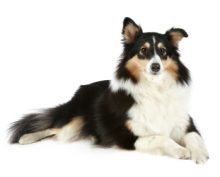Shetland Sheepdog
Lifestyle Needs

The Shetland Sheepdog or ‘Sheltie’ is small sized dog with plenty of energy. He is typically highly intelligent and easy to train in obedience and agility. The Sheltie needs a house with a garden and plenty of exercise every day. He can be somewhat reserved with strangers and would benefit from plenty of socialising. He has a double coat – a soft undercoat and harsher outer coat – which means he is happier in cool or even cold weather. His coat will need grooming thoroughly every day.
Genetic Diversity
(Known as Coefficient of Inbreeding: 'COI'. It should be as low as possible.)
The UK Kennel Club breed average COI is 6.7% - See 'A Beginners Guide to COI'
Gene Pool Size
(Known as Effective Population Size: 'EPS')
77.61
EPS is a measure of how many individuals are contributing genetically to a breed population. It is a measure of the size of the gene pool in a breed. Lower than 100 is considered critical by conservationists and below 50 brings a breed close to extinction. For more information see the Kennel Club article.
Health and Welfare Problems due to Conformation
(Body shape and physical characteristics)
The Sheltie’s very thick coat means that he will need to be kept cool in hot weather, although the air between the two coat layers does help with cooling to a certain extent.
BVA/KC Health Schemes: www.bva.co.uk/chs
- Hip dysplasia: breed 5 year mean score 11.9 (parents should be lower)
- Eye disease: Collie eye anomaly (CEA) (litter screening); Retinal pigment epithelial dystrohy (RPED) (annual testing); PRA; GPRA
Estimated Breeding Values (EBVs) : No EBVs are currently available for this breed
www.thekennelclub.org.uk/about-ebvs
DNA Tests Available
DogWellNet and IPFD Harmonisation of Genetic Testing for Dogs (HGTD)
www.dogwellnet.com/breeds
- Collie Eye Anomaly (CEA/CH)
- Progressive Retinal Atrophy (PRA CNGA1-PRA)
- Multi-drug resistence (MDR1)
- Dermatomyositis
Availability of a DNA test does not mean that it is always necessary or even desirable for breeders to use this test.
Other Breed-Specific Health Screening Schemes
None known
Ask the breeder to show you the certificates for the above tests/screening for both parents. If any of the above tests have not been considered necessary by the breeder (and there may be good reasons), ask her to explain why.
Other Diseases Reported
(For which there are currently no genetic or screening tests for sire or dam)
- Distichiasis
- Dental abnormalities
- MDRI sensitivity
- Congenital deafness (dogs with white coat)
- Cushings disease
- Gallbladder Mucoceles
Ask the breeder about the medical history of the parents, grandparents and great grandparents. Consider carefully whether to purchase a puppy if some of these or other diseases are in the family line.
Ask about the breeder’s policy in cases of serious genetic diseases occurring to your puppy in later life. Good breeders will request to be informed of such events in order to improve future breeding decisions.
You are strongly advised to buy from a breeder who uses (or is prepared to use) the AWF Puppy Contract and Puppy Information Pack (PIP): www.puppycontract.org.uk
The breeder should also be familiar with the CFSG/DBRG Code of Practice for Dog Breeding